Entrepreneurship and Small Business Report: Ventures, SMEs, and Brexit
VerifiedAdded on 2020/10/22
|14
|4205
|398
Report
AI Summary
This report on Entrepreneurship and Small Business Management delves into various aspects of entrepreneurial ventures. It begins by defining entrepreneurship and exploring different types of ventures, including micro, small, medium, and large-sized enterprises, as well as start-ups, social enterprises, and lifestyle firms, and their relationship to entrepreneurial typology. The report then examines the impact of SMEs on the UK economy, discussing their contribution to GDP, employment generation, and innovation. It also analyzes the role of start-ups and SMEs in the growth of the social economy, particularly in the context of Brexit. Furthermore, the report identifies the characteristics, skills, and traits of successful entrepreneurs, using Bill Gates and Steve Jobs as examples, while also addressing the influence of background and experience on fostering or hindering entrepreneurial endeavors. The report provides a comprehensive overview of the entrepreneurial landscape, making it a valuable resource for students studying business and entrepreneurship.

ENTREPRENEURSHIP
AND SMALL BUSINESS
MANAGEMENT
AND SMALL BUSINESS
MANAGEMENT
Paraphrase This Document
Need a fresh take? Get an instant paraphrase of this document with our AI Paraphraser
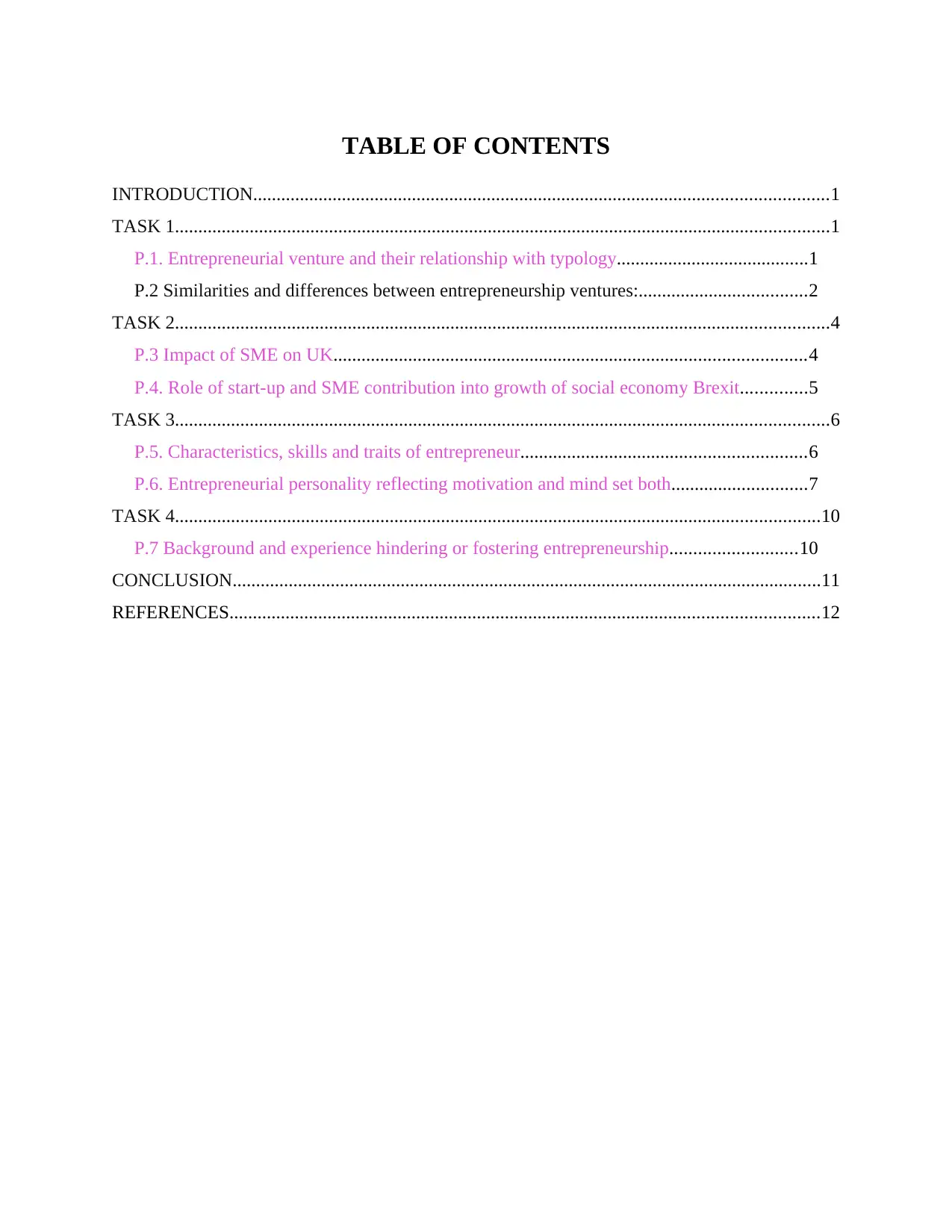
TABLE OF CONTENTS
INTRODUCTION...........................................................................................................................1
TASK 1............................................................................................................................................1
P.1. Entrepreneurial venture and their relationship with typology.........................................1
P.2 Similarities and differences between entrepreneurship ventures:....................................2
TASK 2............................................................................................................................................4
P.3 Impact of SME on UK.....................................................................................................4
P.4. Role of start-up and SME contribution into growth of social economy Brexit..............5
TASK 3............................................................................................................................................6
P.5. Characteristics, skills and traits of entrepreneur.............................................................6
P.6. Entrepreneurial personality reflecting motivation and mind set both.............................7
TASK 4..........................................................................................................................................10
P.7 Background and experience hindering or fostering entrepreneurship...........................10
CONCLUSION..............................................................................................................................11
REFERENCES..............................................................................................................................12
INTRODUCTION...........................................................................................................................1
TASK 1............................................................................................................................................1
P.1. Entrepreneurial venture and their relationship with typology.........................................1
P.2 Similarities and differences between entrepreneurship ventures:....................................2
TASK 2............................................................................................................................................4
P.3 Impact of SME on UK.....................................................................................................4
P.4. Role of start-up and SME contribution into growth of social economy Brexit..............5
TASK 3............................................................................................................................................6
P.5. Characteristics, skills and traits of entrepreneur.............................................................6
P.6. Entrepreneurial personality reflecting motivation and mind set both.............................7
TASK 4..........................................................................................................................................10
P.7 Background and experience hindering or fostering entrepreneurship...........................10
CONCLUSION..............................................................................................................................11
REFERENCES..............................................................................................................................12
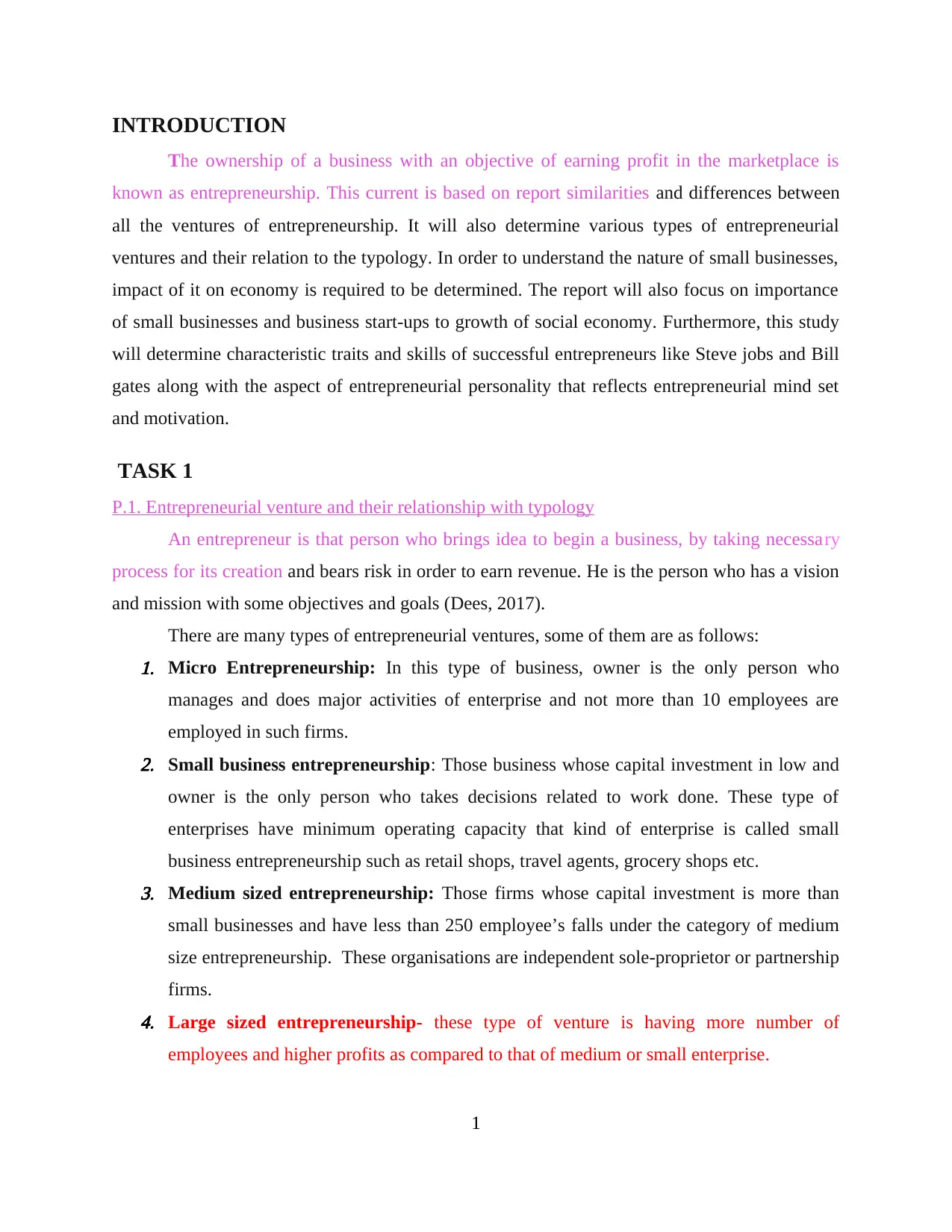
INTRODUCTION
The ownership of a business with an objective of earning profit in the marketplace is
known as entrepreneurship. This current is based on report similarities and differences between
all the ventures of entrepreneurship. It will also determine various types of entrepreneurial
ventures and their relation to the typology. In order to understand the nature of small businesses,
impact of it on economy is required to be determined. The report will also focus on importance
of small businesses and business start-ups to growth of social economy. Furthermore, this study
will determine characteristic traits and skills of successful entrepreneurs like Steve jobs and Bill
gates along with the aspect of entrepreneurial personality that reflects entrepreneurial mind set
and motivation.
TASK 1
P.1. Entrepreneurial venture and their relationship with typology
An entrepreneur is that person who brings idea to begin a business, by taking necessary
process for its creation and bears risk in order to earn revenue. He is the person who has a vision
and mission with some objectives and goals (Dees, 2017).
There are many types of entrepreneurial ventures, some of them are as follows:1. Micro Entrepreneurship: In this type of business, owner is the only person who
manages and does major activities of enterprise and not more than 10 employees are
employed in such firms.2. Small business entrepreneurship: Those business whose capital investment in low and
owner is the only person who takes decisions related to work done. These type of
enterprises have minimum operating capacity that kind of enterprise is called small
business entrepreneurship such as retail shops, travel agents, grocery shops etc.3. Medium sized entrepreneurship: Those firms whose capital investment is more than
small businesses and have less than 250 employee’s falls under the category of medium
size entrepreneurship. These organisations are independent sole-proprietor or partnership
firms.4. Large sized entrepreneurship- these type of venture is having more number of
employees and higher profits as compared to that of medium or small enterprise.
1
The ownership of a business with an objective of earning profit in the marketplace is
known as entrepreneurship. This current is based on report similarities and differences between
all the ventures of entrepreneurship. It will also determine various types of entrepreneurial
ventures and their relation to the typology. In order to understand the nature of small businesses,
impact of it on economy is required to be determined. The report will also focus on importance
of small businesses and business start-ups to growth of social economy. Furthermore, this study
will determine characteristic traits and skills of successful entrepreneurs like Steve jobs and Bill
gates along with the aspect of entrepreneurial personality that reflects entrepreneurial mind set
and motivation.
TASK 1
P.1. Entrepreneurial venture and their relationship with typology
An entrepreneur is that person who brings idea to begin a business, by taking necessary
process for its creation and bears risk in order to earn revenue. He is the person who has a vision
and mission with some objectives and goals (Dees, 2017).
There are many types of entrepreneurial ventures, some of them are as follows:1. Micro Entrepreneurship: In this type of business, owner is the only person who
manages and does major activities of enterprise and not more than 10 employees are
employed in such firms.2. Small business entrepreneurship: Those business whose capital investment in low and
owner is the only person who takes decisions related to work done. These type of
enterprises have minimum operating capacity that kind of enterprise is called small
business entrepreneurship such as retail shops, travel agents, grocery shops etc.3. Medium sized entrepreneurship: Those firms whose capital investment is more than
small businesses and have less than 250 employee’s falls under the category of medium
size entrepreneurship. These organisations are independent sole-proprietor or partnership
firms.4. Large sized entrepreneurship- these type of venture is having more number of
employees and higher profits as compared to that of medium or small enterprise.
1
⊘ This is a preview!⊘
Do you want full access?
Subscribe today to unlock all pages.

Trusted by 1+ million students worldwide
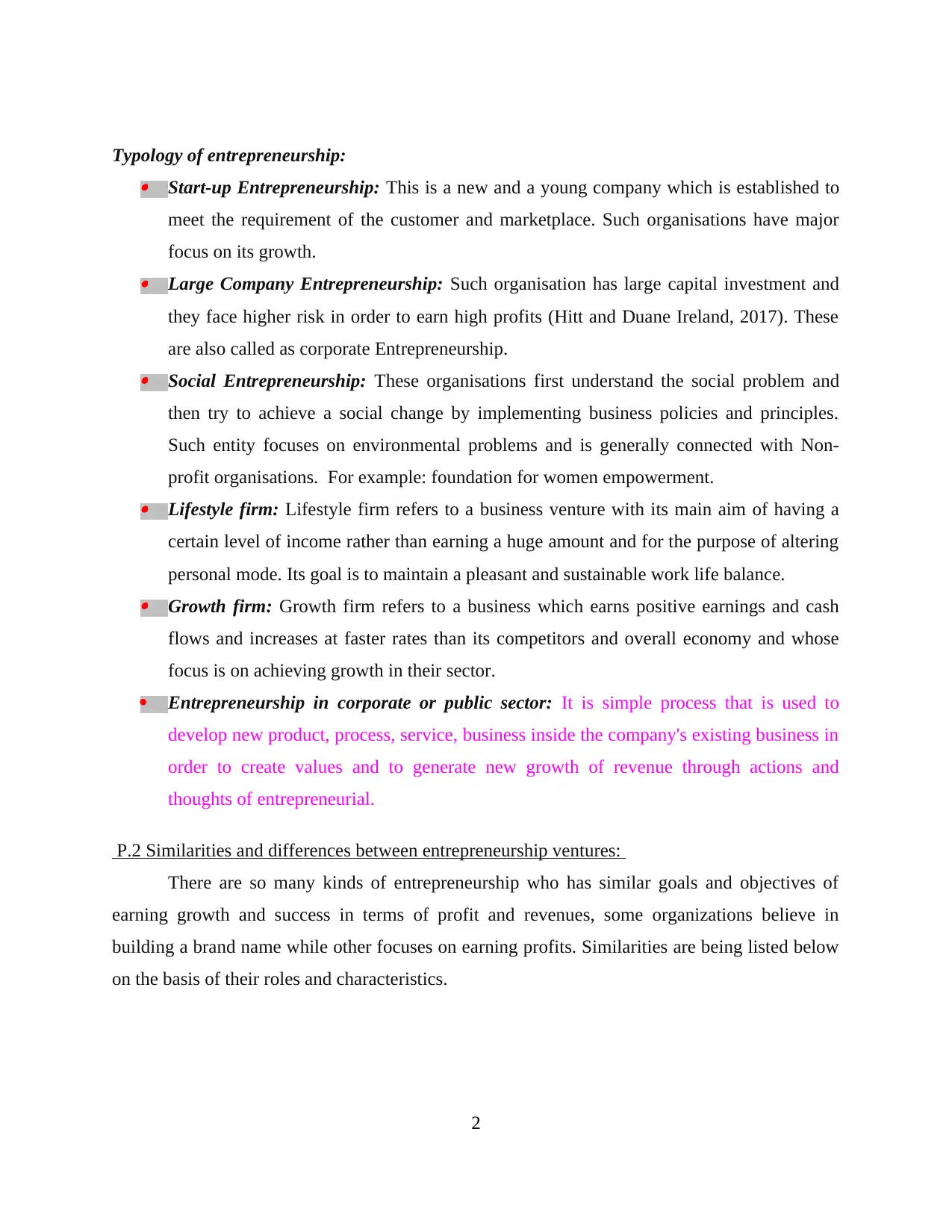
Typology of entrepreneurship: Start-up Entrepreneurship: This is a new and a young company which is established to
meet the requirement of the customer and marketplace. Such organisations have major
focus on its growth. Large Company Entrepreneurship: Such organisation has large capital investment and
they face higher risk in order to earn high profits (Hitt and Duane Ireland, 2017). These
are also called as corporate Entrepreneurship. Social Entrepreneurship: These organisations first understand the social problem and
then try to achieve a social change by implementing business policies and principles.
Such entity focuses on environmental problems and is generally connected with Non-
profit organisations. For example: foundation for women empowerment. Lifestyle firm: Lifestyle firm refers to a business venture with its main aim of having a
certain level of income rather than earning a huge amount and for the purpose of altering
personal mode. Its goal is to maintain a pleasant and sustainable work life balance. Growth firm: Growth firm refers to a business which earns positive earnings and cash
flows and increases at faster rates than its competitors and overall economy and whose
focus is on achieving growth in their sector.
Entrepreneurship in corporate or public sector: It is simple process that is used to
develop new product, process, service, business inside the company's existing business in
order to create values and to generate new growth of revenue through actions and
thoughts of entrepreneurial.
P.2 Similarities and differences between entrepreneurship ventures:
There are so many kinds of entrepreneurship who has similar goals and objectives of
earning growth and success in terms of profit and revenues, some organizations believe in
building a brand name while other focuses on earning profits. Similarities are being listed below
on the basis of their roles and characteristics.
2
meet the requirement of the customer and marketplace. Such organisations have major
focus on its growth. Large Company Entrepreneurship: Such organisation has large capital investment and
they face higher risk in order to earn high profits (Hitt and Duane Ireland, 2017). These
are also called as corporate Entrepreneurship. Social Entrepreneurship: These organisations first understand the social problem and
then try to achieve a social change by implementing business policies and principles.
Such entity focuses on environmental problems and is generally connected with Non-
profit organisations. For example: foundation for women empowerment. Lifestyle firm: Lifestyle firm refers to a business venture with its main aim of having a
certain level of income rather than earning a huge amount and for the purpose of altering
personal mode. Its goal is to maintain a pleasant and sustainable work life balance. Growth firm: Growth firm refers to a business which earns positive earnings and cash
flows and increases at faster rates than its competitors and overall economy and whose
focus is on achieving growth in their sector.
Entrepreneurship in corporate or public sector: It is simple process that is used to
develop new product, process, service, business inside the company's existing business in
order to create values and to generate new growth of revenue through actions and
thoughts of entrepreneurial.
P.2 Similarities and differences between entrepreneurship ventures:
There are so many kinds of entrepreneurship who has similar goals and objectives of
earning growth and success in terms of profit and revenues, some organizations believe in
building a brand name while other focuses on earning profits. Similarities are being listed below
on the basis of their roles and characteristics.
2
Paraphrase This Document
Need a fresh take? Get an instant paraphrase of this document with our AI Paraphraser
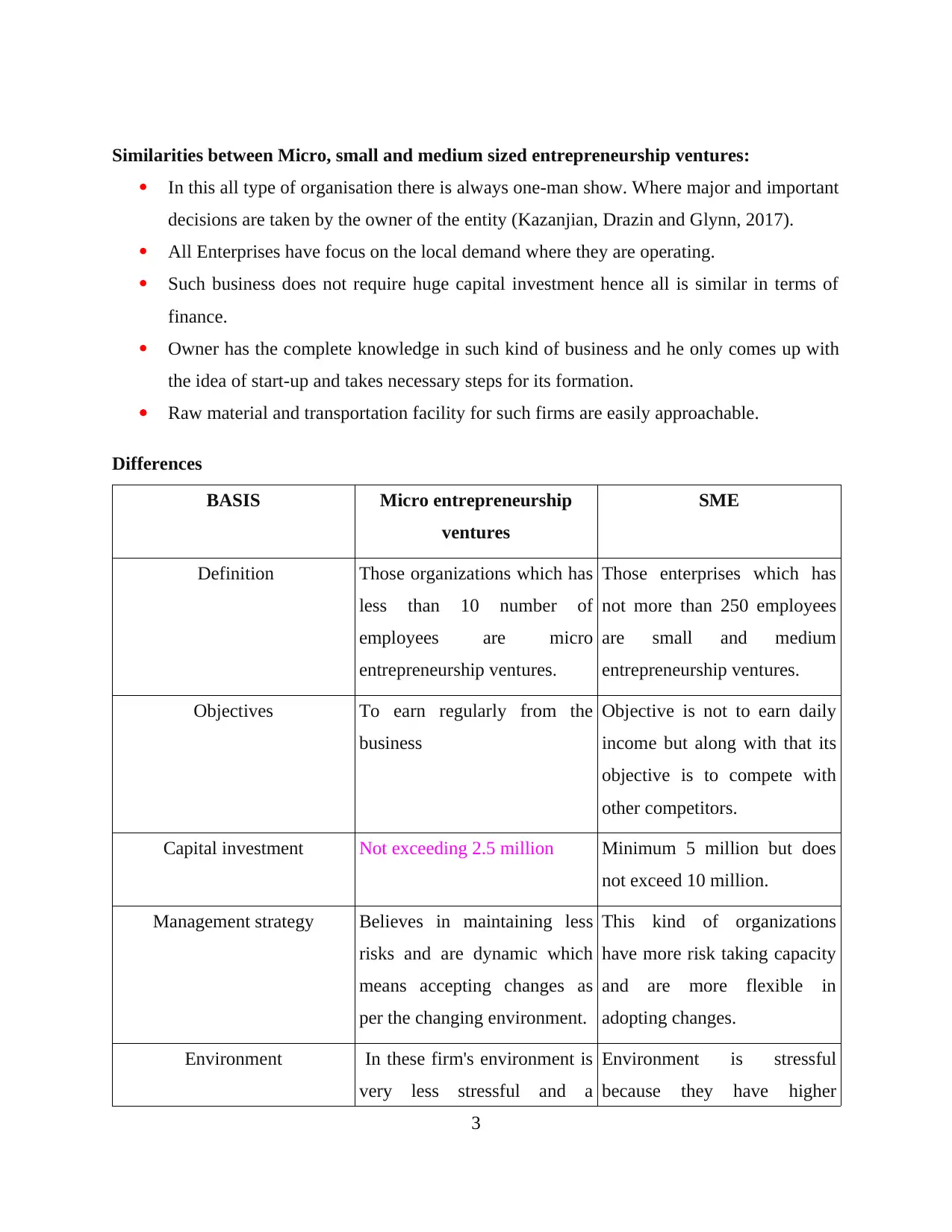
Similarities between Micro, small and medium sized entrepreneurship ventures:
In this all type of organisation there is always one-man show. Where major and important
decisions are taken by the owner of the entity (Kazanjian, Drazin and Glynn, 2017).
All Enterprises have focus on the local demand where they are operating.
Such business does not require huge capital investment hence all is similar in terms of
finance.
Owner has the complete knowledge in such kind of business and he only comes up with
the idea of start-up and takes necessary steps for its formation.
Raw material and transportation facility for such firms are easily approachable.
Differences
BASIS Micro entrepreneurship
ventures
SME
Definition Those organizations which has
less than 10 number of
employees are micro
entrepreneurship ventures.
Those enterprises which has
not more than 250 employees
are small and medium
entrepreneurship ventures.
Objectives To earn regularly from the
business
Objective is not to earn daily
income but along with that its
objective is to compete with
other competitors.
Capital investment Not exceeding 2.5 million Minimum 5 million but does
not exceed 10 million.
Management strategy Believes in maintaining less
risks and are dynamic which
means accepting changes as
per the changing environment.
This kind of organizations
have more risk taking capacity
and are more flexible in
adopting changes.
Environment In these firm's environment is
very less stressful and a
Environment is stressful
because they have higher
3
In this all type of organisation there is always one-man show. Where major and important
decisions are taken by the owner of the entity (Kazanjian, Drazin and Glynn, 2017).
All Enterprises have focus on the local demand where they are operating.
Such business does not require huge capital investment hence all is similar in terms of
finance.
Owner has the complete knowledge in such kind of business and he only comes up with
the idea of start-up and takes necessary steps for its formation.
Raw material and transportation facility for such firms are easily approachable.
Differences
BASIS Micro entrepreneurship
ventures
SME
Definition Those organizations which has
less than 10 number of
employees are micro
entrepreneurship ventures.
Those enterprises which has
not more than 250 employees
are small and medium
entrepreneurship ventures.
Objectives To earn regularly from the
business
Objective is not to earn daily
income but along with that its
objective is to compete with
other competitors.
Capital investment Not exceeding 2.5 million Minimum 5 million but does
not exceed 10 million.
Management strategy Believes in maintaining less
risks and are dynamic which
means accepting changes as
per the changing environment.
This kind of organizations
have more risk taking capacity
and are more flexible in
adopting changes.
Environment In these firm's environment is
very less stressful and a
Environment is stressful
because they have higher
3
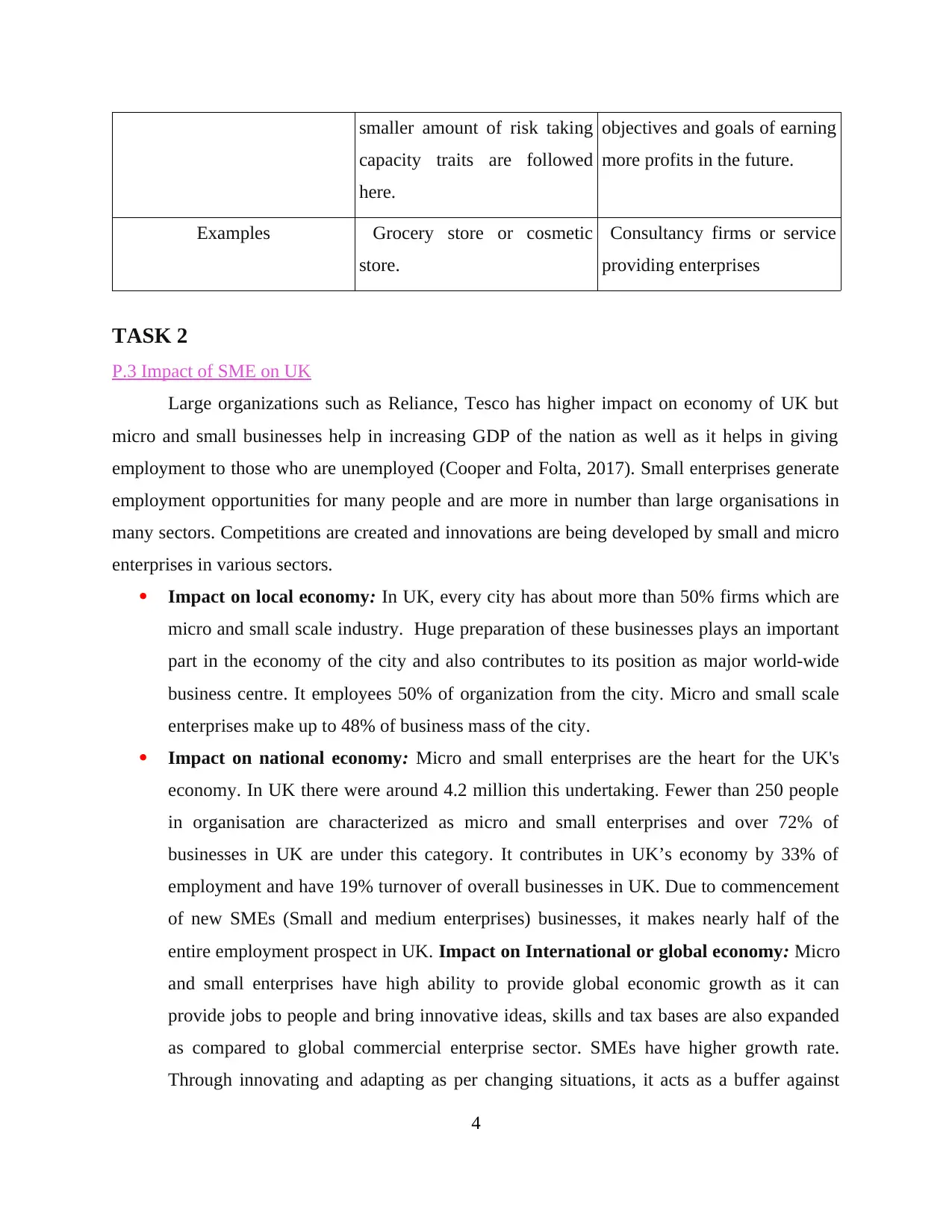
smaller amount of risk taking
capacity traits are followed
here.
objectives and goals of earning
more profits in the future.
Examples Grocery store or cosmetic
store.
Consultancy firms or service
providing enterprises
TASK 2
P.3 Impact of SME on UK
Large organizations such as Reliance, Tesco has higher impact on economy of UK but
micro and small businesses help in increasing GDP of the nation as well as it helps in giving
employment to those who are unemployed (Cooper and Folta, 2017). Small enterprises generate
employment opportunities for many people and are more in number than large organisations in
many sectors. Competitions are created and innovations are being developed by small and micro
enterprises in various sectors.
Impact on local economy: In UK, every city has about more than 50% firms which are
micro and small scale industry. Huge preparation of these businesses plays an important
part in the economy of the city and also contributes to its position as major world-wide
business centre. It employees 50% of organization from the city. Micro and small scale
enterprises make up to 48% of business mass of the city.
Impact on national economy: Micro and small enterprises are the heart for the UK's
economy. In UK there were around 4.2 million this undertaking. Fewer than 250 people
in organisation are characterized as micro and small enterprises and over 72% of
businesses in UK are under this category. It contributes in UK’s economy by 33% of
employment and have 19% turnover of overall businesses in UK. Due to commencement
of new SMEs (Small and medium enterprises) businesses, it makes nearly half of the
entire employment prospect in UK. Impact on International or global economy: Micro
and small enterprises have high ability to provide global economic growth as it can
provide jobs to people and bring innovative ideas, skills and tax bases are also expanded
as compared to global commercial enterprise sector. SMEs have higher growth rate.
Through innovating and adapting as per changing situations, it acts as a buffer against
4
capacity traits are followed
here.
objectives and goals of earning
more profits in the future.
Examples Grocery store or cosmetic
store.
Consultancy firms or service
providing enterprises
TASK 2
P.3 Impact of SME on UK
Large organizations such as Reliance, Tesco has higher impact on economy of UK but
micro and small businesses help in increasing GDP of the nation as well as it helps in giving
employment to those who are unemployed (Cooper and Folta, 2017). Small enterprises generate
employment opportunities for many people and are more in number than large organisations in
many sectors. Competitions are created and innovations are being developed by small and micro
enterprises in various sectors.
Impact on local economy: In UK, every city has about more than 50% firms which are
micro and small scale industry. Huge preparation of these businesses plays an important
part in the economy of the city and also contributes to its position as major world-wide
business centre. It employees 50% of organization from the city. Micro and small scale
enterprises make up to 48% of business mass of the city.
Impact on national economy: Micro and small enterprises are the heart for the UK's
economy. In UK there were around 4.2 million this undertaking. Fewer than 250 people
in organisation are characterized as micro and small enterprises and over 72% of
businesses in UK are under this category. It contributes in UK’s economy by 33% of
employment and have 19% turnover of overall businesses in UK. Due to commencement
of new SMEs (Small and medium enterprises) businesses, it makes nearly half of the
entire employment prospect in UK. Impact on International or global economy: Micro
and small enterprises have high ability to provide global economic growth as it can
provide jobs to people and bring innovative ideas, skills and tax bases are also expanded
as compared to global commercial enterprise sector. SMEs have higher growth rate.
Through innovating and adapting as per changing situations, it acts as a buffer against
4
⊘ This is a preview!⊘
Do you want full access?
Subscribe today to unlock all pages.

Trusted by 1+ million students worldwide
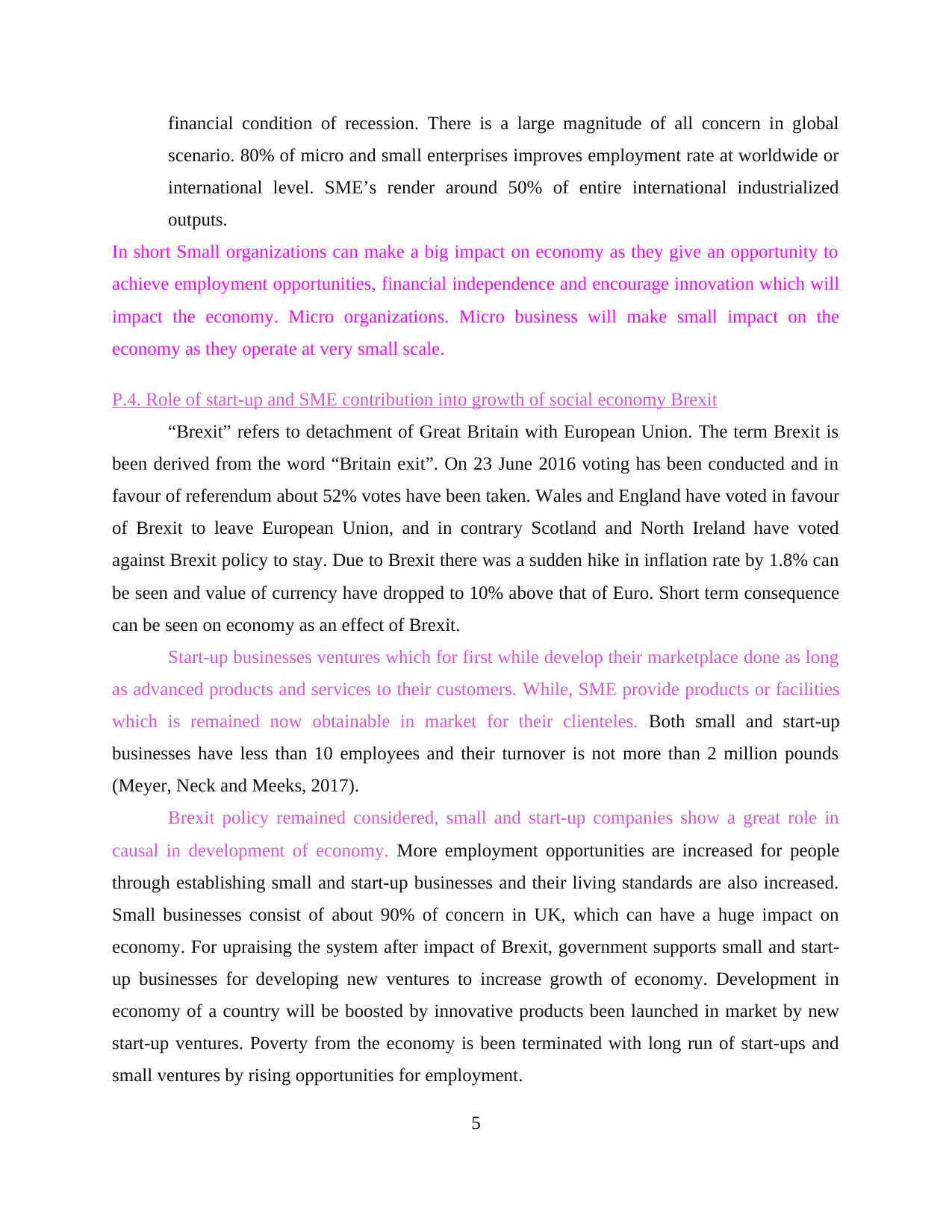
financial condition of recession. There is a large magnitude of all concern in global
scenario. 80% of micro and small enterprises improves employment rate at worldwide or
international level. SME’s render around 50% of entire international industrialized
outputs.
In short Small organizations can make a big impact on economy as they give an opportunity to
achieve employment opportunities, financial independence and encourage innovation which will
impact the economy. Micro organizations. Micro business will make small impact on the
economy as they operate at very small scale.
P.4. Role of start-up and SME contribution into growth of social economy Brexit
“Brexit” refers to detachment of Great Britain with European Union. The term Brexit is
been derived from the word “Britain exit”. On 23 June 2016 voting has been conducted and in
favour of referendum about 52% votes have been taken. Wales and England have voted in favour
of Brexit to leave European Union, and in contrary Scotland and North Ireland have voted
against Brexit policy to stay. Due to Brexit there was a sudden hike in inflation rate by 1.8% can
be seen and value of currency have dropped to 10% above that of Euro. Short term consequence
can be seen on economy as an effect of Brexit.
Start-up businesses ventures which for first while develop their marketplace done as long
as advanced products and services to their customers. While, SME provide products or facilities
which is remained now obtainable in market for their clienteles. Both small and start-up
businesses have less than 10 employees and their turnover is not more than 2 million pounds
(Meyer, Neck and Meeks, 2017).
Brexit policy remained considered, small and start-up companies show a great role in
causal in development of economy. More employment opportunities are increased for people
through establishing small and start-up businesses and their living standards are also increased.
Small businesses consist of about 90% of concern in UK, which can have a huge impact on
economy. For upraising the system after impact of Brexit, government supports small and start-
up businesses for developing new ventures to increase growth of economy. Development in
economy of a country will be boosted by innovative products been launched in market by new
start-up ventures. Poverty from the economy is been terminated with long run of start-ups and
small ventures by rising opportunities for employment.
5
scenario. 80% of micro and small enterprises improves employment rate at worldwide or
international level. SME’s render around 50% of entire international industrialized
outputs.
In short Small organizations can make a big impact on economy as they give an opportunity to
achieve employment opportunities, financial independence and encourage innovation which will
impact the economy. Micro organizations. Micro business will make small impact on the
economy as they operate at very small scale.
P.4. Role of start-up and SME contribution into growth of social economy Brexit
“Brexit” refers to detachment of Great Britain with European Union. The term Brexit is
been derived from the word “Britain exit”. On 23 June 2016 voting has been conducted and in
favour of referendum about 52% votes have been taken. Wales and England have voted in favour
of Brexit to leave European Union, and in contrary Scotland and North Ireland have voted
against Brexit policy to stay. Due to Brexit there was a sudden hike in inflation rate by 1.8% can
be seen and value of currency have dropped to 10% above that of Euro. Short term consequence
can be seen on economy as an effect of Brexit.
Start-up businesses ventures which for first while develop their marketplace done as long
as advanced products and services to their customers. While, SME provide products or facilities
which is remained now obtainable in market for their clienteles. Both small and start-up
businesses have less than 10 employees and their turnover is not more than 2 million pounds
(Meyer, Neck and Meeks, 2017).
Brexit policy remained considered, small and start-up companies show a great role in
causal in development of economy. More employment opportunities are increased for people
through establishing small and start-up businesses and their living standards are also increased.
Small businesses consist of about 90% of concern in UK, which can have a huge impact on
economy. For upraising the system after impact of Brexit, government supports small and start-
up businesses for developing new ventures to increase growth of economy. Development in
economy of a country will be boosted by innovative products been launched in market by new
start-up ventures. Poverty from the economy is been terminated with long run of start-ups and
small ventures by rising opportunities for employment.
5
Paraphrase This Document
Need a fresh take? Get an instant paraphrase of this document with our AI Paraphraser
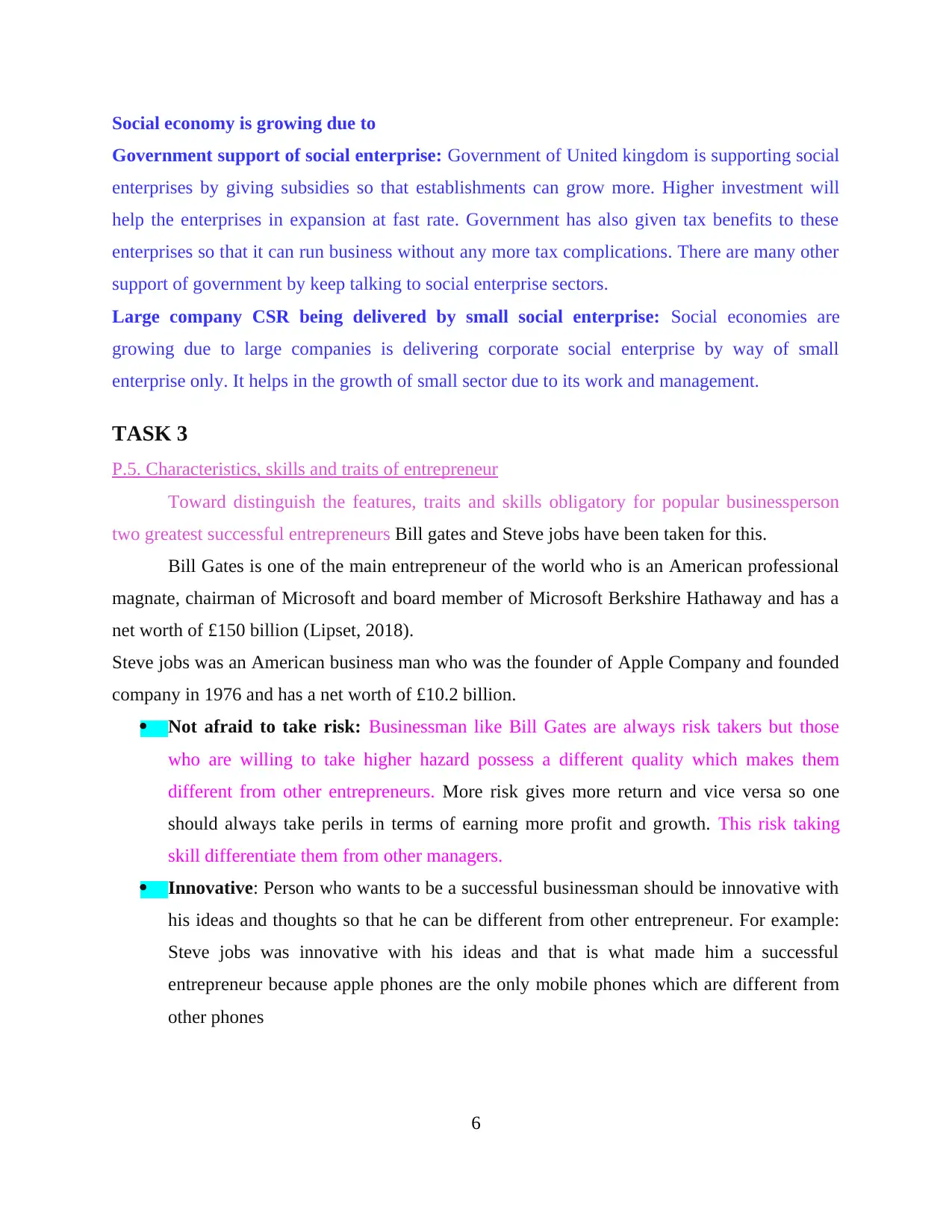
Social economy is growing due to
Government support of social enterprise: Government of United kingdom is supporting social
enterprises by giving subsidies so that establishments can grow more. Higher investment will
help the enterprises in expansion at fast rate. Government has also given tax benefits to these
enterprises so that it can run business without any more tax complications. There are many other
support of government by keep talking to social enterprise sectors.
Large company CSR being delivered by small social enterprise: Social economies are
growing due to large companies is delivering corporate social enterprise by way of small
enterprise only. It helps in the growth of small sector due to its work and management.
TASK 3
P.5. Characteristics, skills and traits of entrepreneur
Toward distinguish the features, traits and skills obligatory for popular businessperson
two greatest successful entrepreneurs Bill gates and Steve jobs have been taken for this.
Bill Gates is one of the main entrepreneur of the world who is an American professional
magnate, chairman of Microsoft and board member of Microsoft Berkshire Hathaway and has a
net worth of £150 billion (Lipset, 2018).
Steve jobs was an American business man who was the founder of Apple Company and founded
company in 1976 and has a net worth of £10.2 billion.
Not afraid to take risk: Businessman like Bill Gates are always risk takers but those
who are willing to take higher hazard possess a different quality which makes them
different from other entrepreneurs. More risk gives more return and vice versa so one
should always take perils in terms of earning more profit and growth. This risk taking
skill differentiate them from other managers.
Innovative: Person who wants to be a successful businessman should be innovative with
his ideas and thoughts so that he can be different from other entrepreneur. For example:
Steve jobs was innovative with his ideas and that is what made him a successful
entrepreneur because apple phones are the only mobile phones which are different from
other phones
6
Government support of social enterprise: Government of United kingdom is supporting social
enterprises by giving subsidies so that establishments can grow more. Higher investment will
help the enterprises in expansion at fast rate. Government has also given tax benefits to these
enterprises so that it can run business without any more tax complications. There are many other
support of government by keep talking to social enterprise sectors.
Large company CSR being delivered by small social enterprise: Social economies are
growing due to large companies is delivering corporate social enterprise by way of small
enterprise only. It helps in the growth of small sector due to its work and management.
TASK 3
P.5. Characteristics, skills and traits of entrepreneur
Toward distinguish the features, traits and skills obligatory for popular businessperson
two greatest successful entrepreneurs Bill gates and Steve jobs have been taken for this.
Bill Gates is one of the main entrepreneur of the world who is an American professional
magnate, chairman of Microsoft and board member of Microsoft Berkshire Hathaway and has a
net worth of £150 billion (Lipset, 2018).
Steve jobs was an American business man who was the founder of Apple Company and founded
company in 1976 and has a net worth of £10.2 billion.
Not afraid to take risk: Businessman like Bill Gates are always risk takers but those
who are willing to take higher hazard possess a different quality which makes them
different from other entrepreneurs. More risk gives more return and vice versa so one
should always take perils in terms of earning more profit and growth. This risk taking
skill differentiate them from other managers.
Innovative: Person who wants to be a successful businessman should be innovative with
his ideas and thoughts so that he can be different from other entrepreneur. For example:
Steve jobs was innovative with his ideas and that is what made him a successful
entrepreneur because apple phones are the only mobile phones which are different from
other phones
6
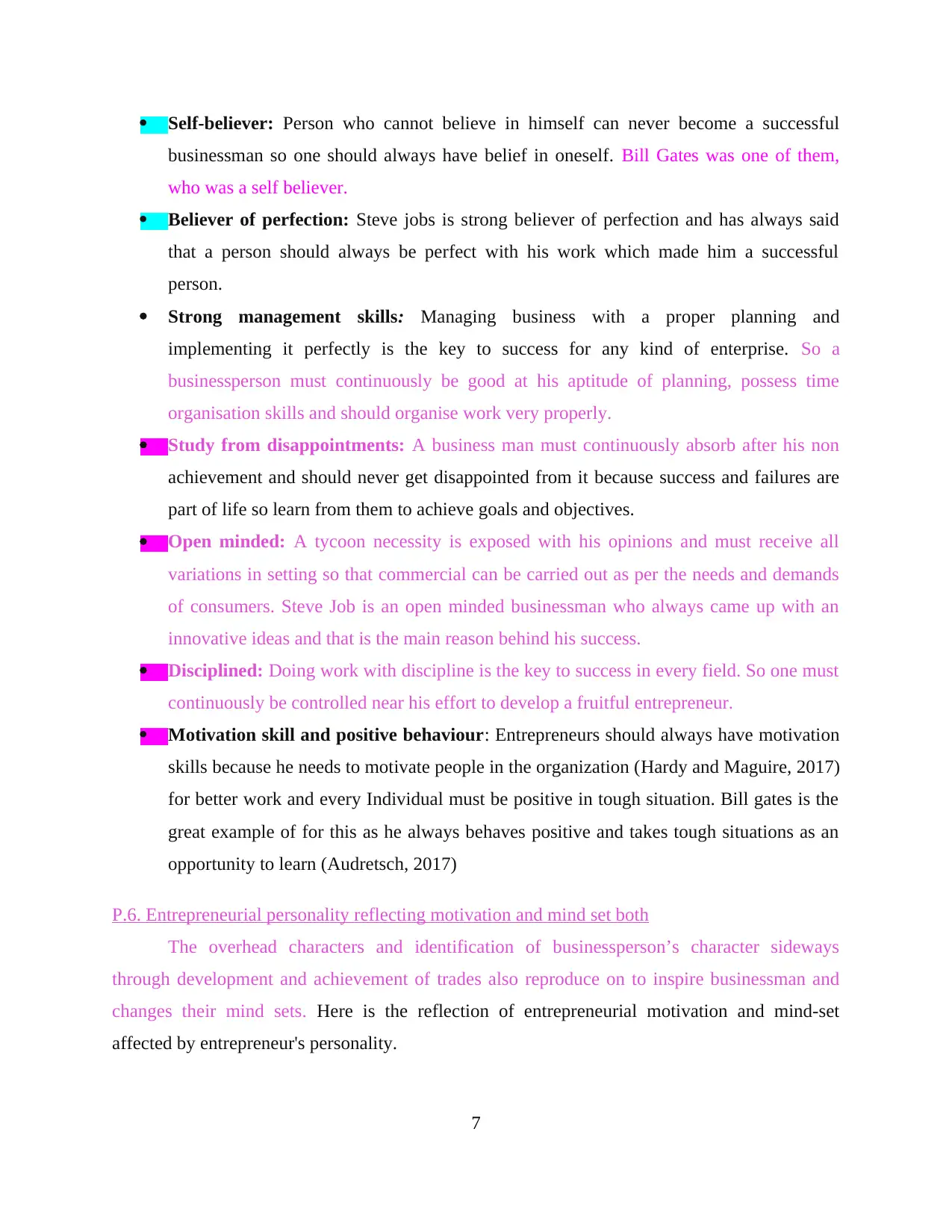
Self-believer: Person who cannot believe in himself can never become a successful
businessman so one should always have belief in oneself. Bill Gates was one of them,
who was a self believer.
Believer of perfection: Steve jobs is strong believer of perfection and has always said
that a person should always be perfect with his work which made him a successful
person.
Strong management skills: Managing business with a proper planning and
implementing it perfectly is the key to success for any kind of enterprise. So a
businessperson must continuously be good at his aptitude of planning, possess time
organisation skills and should organise work very properly.
Study from disappointments: A business man must continuously absorb after his non
achievement and should never get disappointed from it because success and failures are
part of life so learn from them to achieve goals and objectives.
Open minded: A tycoon necessity is exposed with his opinions and must receive all
variations in setting so that commercial can be carried out as per the needs and demands
of consumers. Steve Job is an open minded businessman who always came up with an
innovative ideas and that is the main reason behind his success.
Disciplined: Doing work with discipline is the key to success in every field. So one must
continuously be controlled near his effort to develop a fruitful entrepreneur.
Motivation skill and positive behaviour: Entrepreneurs should always have motivation
skills because he needs to motivate people in the organization (Hardy and Maguire, 2017)
for better work and every Individual must be positive in tough situation. Bill gates is the
great example of for this as he always behaves positive and takes tough situations as an
opportunity to learn (Audretsch, 2017)
P.6. Entrepreneurial personality reflecting motivation and mind set both
The overhead characters and identification of businessperson’s character sideways
through development and achievement of trades also reproduce on to inspire businessman and
changes their mind sets. Here is the reflection of entrepreneurial motivation and mind-set
affected by entrepreneur's personality.
7
businessman so one should always have belief in oneself. Bill Gates was one of them,
who was a self believer.
Believer of perfection: Steve jobs is strong believer of perfection and has always said
that a person should always be perfect with his work which made him a successful
person.
Strong management skills: Managing business with a proper planning and
implementing it perfectly is the key to success for any kind of enterprise. So a
businessperson must continuously be good at his aptitude of planning, possess time
organisation skills and should organise work very properly.
Study from disappointments: A business man must continuously absorb after his non
achievement and should never get disappointed from it because success and failures are
part of life so learn from them to achieve goals and objectives.
Open minded: A tycoon necessity is exposed with his opinions and must receive all
variations in setting so that commercial can be carried out as per the needs and demands
of consumers. Steve Job is an open minded businessman who always came up with an
innovative ideas and that is the main reason behind his success.
Disciplined: Doing work with discipline is the key to success in every field. So one must
continuously be controlled near his effort to develop a fruitful entrepreneur.
Motivation skill and positive behaviour: Entrepreneurs should always have motivation
skills because he needs to motivate people in the organization (Hardy and Maguire, 2017)
for better work and every Individual must be positive in tough situation. Bill gates is the
great example of for this as he always behaves positive and takes tough situations as an
opportunity to learn (Audretsch, 2017)
P.6. Entrepreneurial personality reflecting motivation and mind set both
The overhead characters and identification of businessperson’s character sideways
through development and achievement of trades also reproduce on to inspire businessman and
changes their mind sets. Here is the reflection of entrepreneurial motivation and mind-set
affected by entrepreneur's personality.
7
⊘ This is a preview!⊘
Do you want full access?
Subscribe today to unlock all pages.

Trusted by 1+ million students worldwide
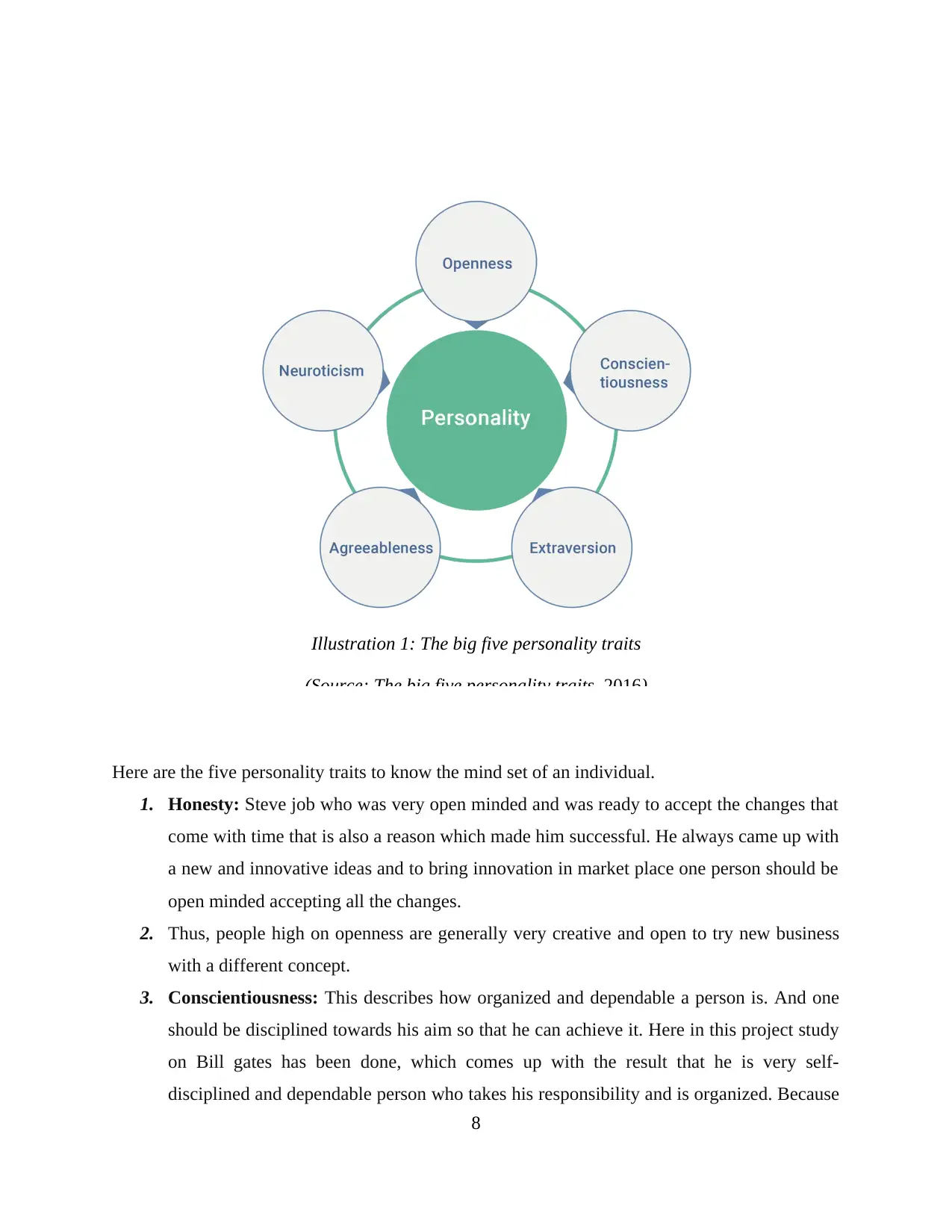
Here are the five personality traits to know the mind set of an individual.
1. Honesty: Steve job who was very open minded and was ready to accept the changes that
come with time that is also a reason which made him successful. He always came up with
a new and innovative ideas and to bring innovation in market place one person should be
open minded accepting all the changes.
2. Thus, people high on openness are generally very creative and open to try new business
with a different concept.
3. Conscientiousness: This describes how organized and dependable a person is. And one
should be disciplined towards his aim so that he can achieve it. Here in this project study
on Bill gates has been done, which comes up with the result that he is very self-
disciplined and dependable person who takes his responsibility and is organized. Because
8
Illustration 1: The big five personality traits
(Source: The big five personality traits, 2016)
1. Honesty: Steve job who was very open minded and was ready to accept the changes that
come with time that is also a reason which made him successful. He always came up with
a new and innovative ideas and to bring innovation in market place one person should be
open minded accepting all the changes.
2. Thus, people high on openness are generally very creative and open to try new business
with a different concept.
3. Conscientiousness: This describes how organized and dependable a person is. And one
should be disciplined towards his aim so that he can achieve it. Here in this project study
on Bill gates has been done, which comes up with the result that he is very self-
disciplined and dependable person who takes his responsibility and is organized. Because
8
Illustration 1: The big five personality traits
(Source: The big five personality traits, 2016)
Paraphrase This Document
Need a fresh take? Get an instant paraphrase of this document with our AI Paraphraser
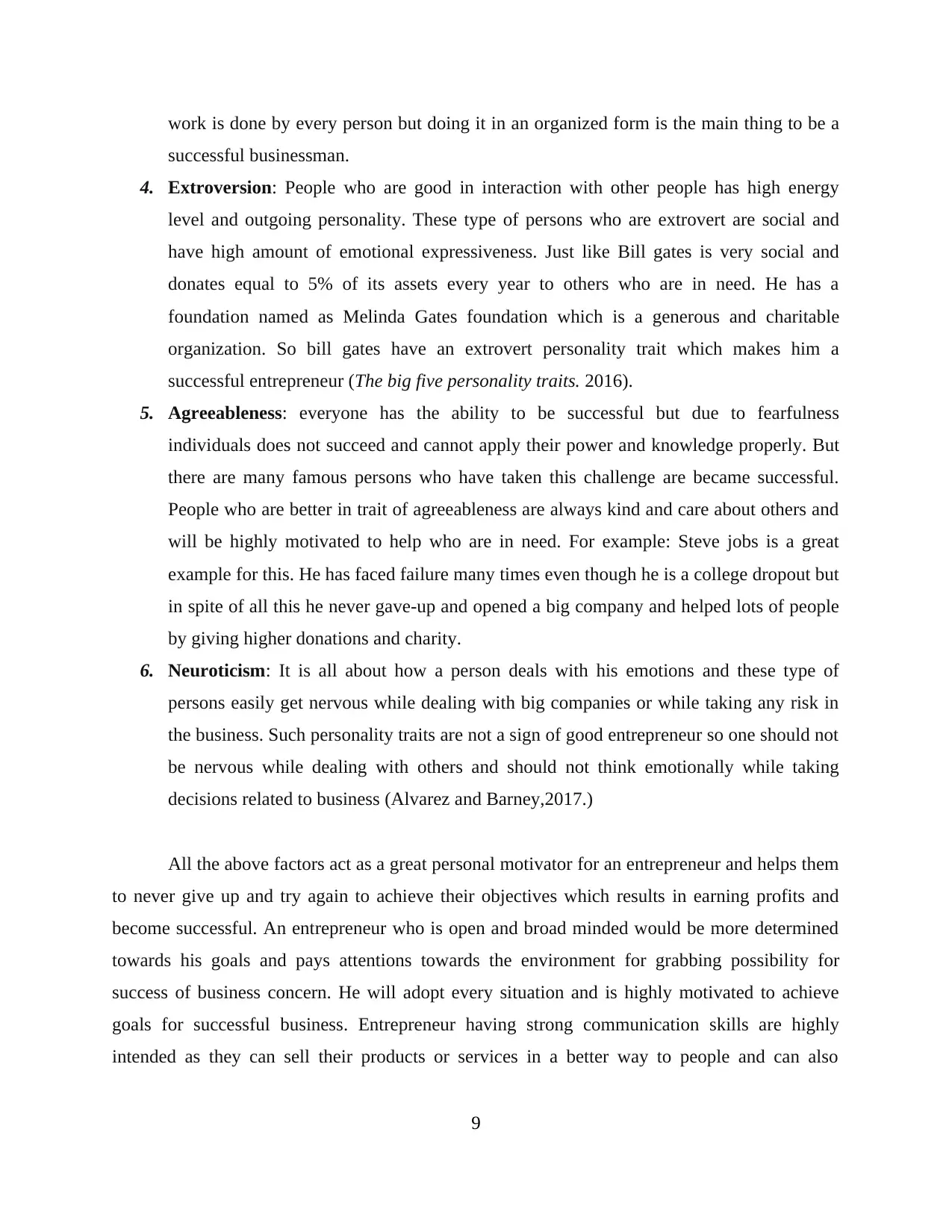
work is done by every person but doing it in an organized form is the main thing to be a
successful businessman.
4. Extroversion: People who are good in interaction with other people has high energy
level and outgoing personality. These type of persons who are extrovert are social and
have high amount of emotional expressiveness. Just like Bill gates is very social and
donates equal to 5% of its assets every year to others who are in need. He has a
foundation named as Melinda Gates foundation which is a generous and charitable
organization. So bill gates have an extrovert personality trait which makes him a
successful entrepreneur (The big five personality traits. 2016).
5. Agreeableness: everyone has the ability to be successful but due to fearfulness
individuals does not succeed and cannot apply their power and knowledge properly. But
there are many famous persons who have taken this challenge are became successful.
People who are better in trait of agreeableness are always kind and care about others and
will be highly motivated to help who are in need. For example: Steve jobs is a great
example for this. He has faced failure many times even though he is a college dropout but
in spite of all this he never gave-up and opened a big company and helped lots of people
by giving higher donations and charity.
6. Neuroticism: It is all about how a person deals with his emotions and these type of
persons easily get nervous while dealing with big companies or while taking any risk in
the business. Such personality traits are not a sign of good entrepreneur so one should not
be nervous while dealing with others and should not think emotionally while taking
decisions related to business (Alvarez and Barney,2017.)
All the above factors act as a great personal motivator for an entrepreneur and helps them
to never give up and try again to achieve their objectives which results in earning profits and
become successful. An entrepreneur who is open and broad minded would be more determined
towards his goals and pays attentions towards the environment for grabbing possibility for
success of business concern. He will adopt every situation and is highly motivated to achieve
goals for successful business. Entrepreneur having strong communication skills are highly
intended as they can sell their products or services in a better way to people and can also
9
successful businessman.
4. Extroversion: People who are good in interaction with other people has high energy
level and outgoing personality. These type of persons who are extrovert are social and
have high amount of emotional expressiveness. Just like Bill gates is very social and
donates equal to 5% of its assets every year to others who are in need. He has a
foundation named as Melinda Gates foundation which is a generous and charitable
organization. So bill gates have an extrovert personality trait which makes him a
successful entrepreneur (The big five personality traits. 2016).
5. Agreeableness: everyone has the ability to be successful but due to fearfulness
individuals does not succeed and cannot apply their power and knowledge properly. But
there are many famous persons who have taken this challenge are became successful.
People who are better in trait of agreeableness are always kind and care about others and
will be highly motivated to help who are in need. For example: Steve jobs is a great
example for this. He has faced failure many times even though he is a college dropout but
in spite of all this he never gave-up and opened a big company and helped lots of people
by giving higher donations and charity.
6. Neuroticism: It is all about how a person deals with his emotions and these type of
persons easily get nervous while dealing with big companies or while taking any risk in
the business. Such personality traits are not a sign of good entrepreneur so one should not
be nervous while dealing with others and should not think emotionally while taking
decisions related to business (Alvarez and Barney,2017.)
All the above factors act as a great personal motivator for an entrepreneur and helps them
to never give up and try again to achieve their objectives which results in earning profits and
become successful. An entrepreneur who is open and broad minded would be more determined
towards his goals and pays attentions towards the environment for grabbing possibility for
success of business concern. He will adopt every situation and is highly motivated to achieve
goals for successful business. Entrepreneur having strong communication skills are highly
intended as they can sell their products or services in a better way to people and can also
9
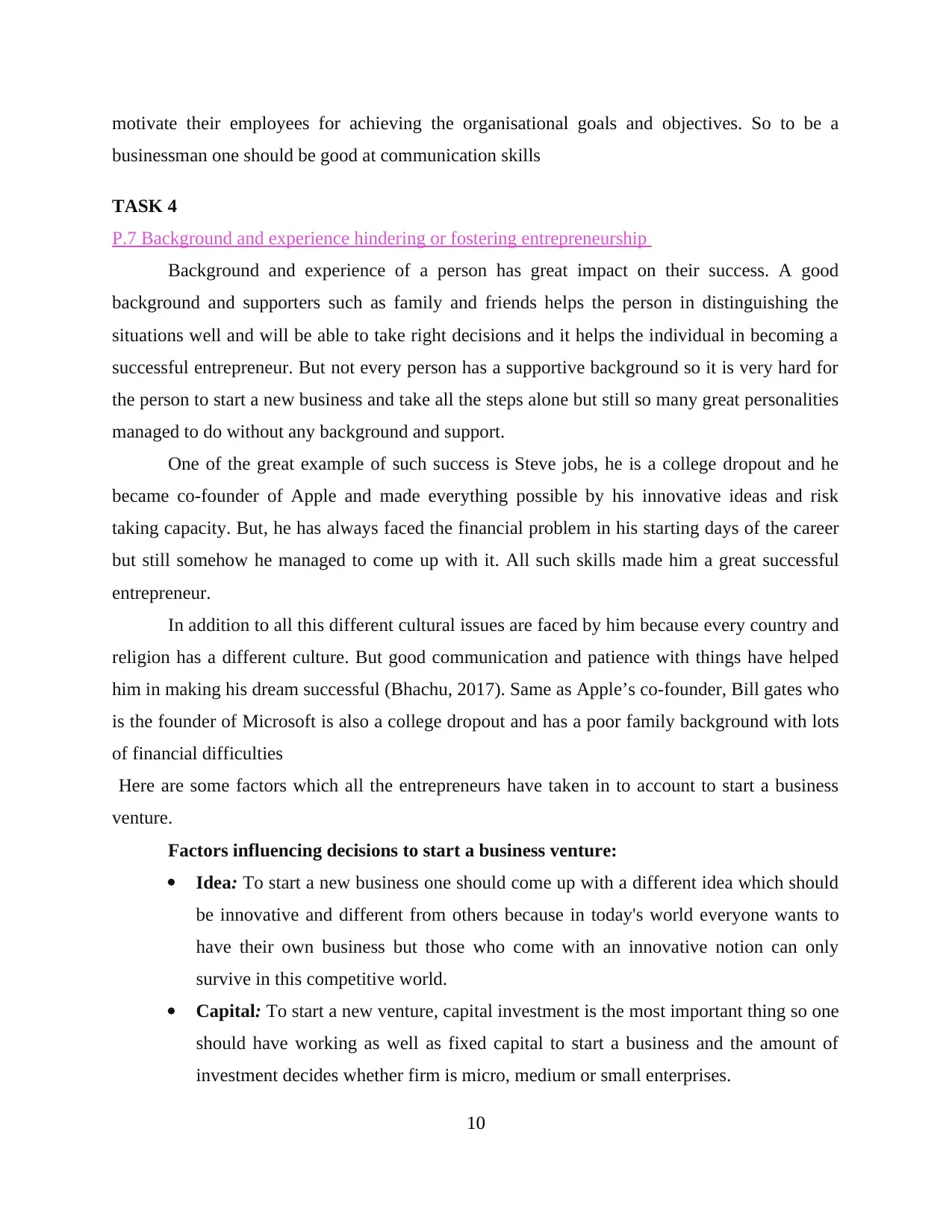
motivate their employees for achieving the organisational goals and objectives. So to be a
businessman one should be good at communication skills
TASK 4
P.7 Background and experience hindering or fostering entrepreneurship
Background and experience of a person has great impact on their success. A good
background and supporters such as family and friends helps the person in distinguishing the
situations well and will be able to take right decisions and it helps the individual in becoming a
successful entrepreneur. But not every person has a supportive background so it is very hard for
the person to start a new business and take all the steps alone but still so many great personalities
managed to do without any background and support.
One of the great example of such success is Steve jobs, he is a college dropout and he
became co-founder of Apple and made everything possible by his innovative ideas and risk
taking capacity. But, he has always faced the financial problem in his starting days of the career
but still somehow he managed to come up with it. All such skills made him a great successful
entrepreneur.
In addition to all this different cultural issues are faced by him because every country and
religion has a different culture. But good communication and patience with things have helped
him in making his dream successful (Bhachu, 2017). Same as Apple’s co-founder, Bill gates who
is the founder of Microsoft is also a college dropout and has a poor family background with lots
of financial difficulties
Here are some factors which all the entrepreneurs have taken in to account to start a business
venture.
Factors influencing decisions to start a business venture:
Idea: To start a new business one should come up with a different idea which should
be innovative and different from others because in today's world everyone wants to
have their own business but those who come with an innovative notion can only
survive in this competitive world.
Capital: To start a new venture, capital investment is the most important thing so one
should have working as well as fixed capital to start a business and the amount of
investment decides whether firm is micro, medium or small enterprises.
10
businessman one should be good at communication skills
TASK 4
P.7 Background and experience hindering or fostering entrepreneurship
Background and experience of a person has great impact on their success. A good
background and supporters such as family and friends helps the person in distinguishing the
situations well and will be able to take right decisions and it helps the individual in becoming a
successful entrepreneur. But not every person has a supportive background so it is very hard for
the person to start a new business and take all the steps alone but still so many great personalities
managed to do without any background and support.
One of the great example of such success is Steve jobs, he is a college dropout and he
became co-founder of Apple and made everything possible by his innovative ideas and risk
taking capacity. But, he has always faced the financial problem in his starting days of the career
but still somehow he managed to come up with it. All such skills made him a great successful
entrepreneur.
In addition to all this different cultural issues are faced by him because every country and
religion has a different culture. But good communication and patience with things have helped
him in making his dream successful (Bhachu, 2017). Same as Apple’s co-founder, Bill gates who
is the founder of Microsoft is also a college dropout and has a poor family background with lots
of financial difficulties
Here are some factors which all the entrepreneurs have taken in to account to start a business
venture.
Factors influencing decisions to start a business venture:
Idea: To start a new business one should come up with a different idea which should
be innovative and different from others because in today's world everyone wants to
have their own business but those who come with an innovative notion can only
survive in this competitive world.
Capital: To start a new venture, capital investment is the most important thing so one
should have working as well as fixed capital to start a business and the amount of
investment decides whether firm is micro, medium or small enterprises.
10
⊘ This is a preview!⊘
Do you want full access?
Subscribe today to unlock all pages.

Trusted by 1+ million students worldwide
1 out of 14
Related Documents
Your All-in-One AI-Powered Toolkit for Academic Success.
+13062052269
info@desklib.com
Available 24*7 on WhatsApp / Email
![[object Object]](/_next/static/media/star-bottom.7253800d.svg)
Unlock your academic potential
Copyright © 2020–2025 A2Z Services. All Rights Reserved. Developed and managed by ZUCOL.





